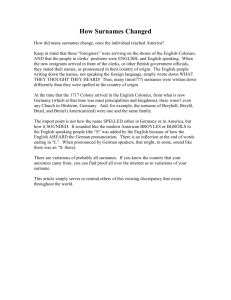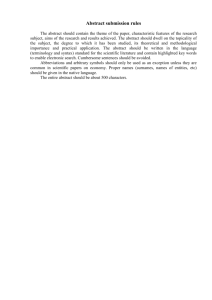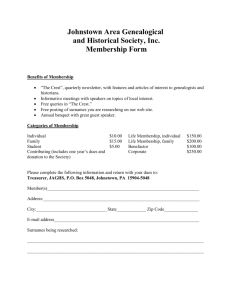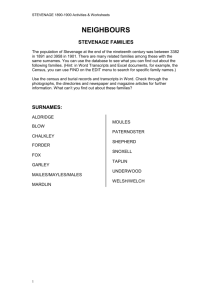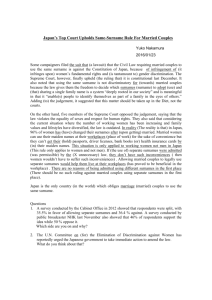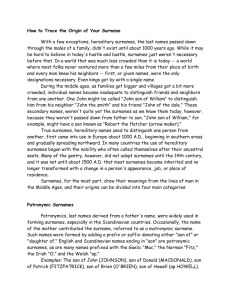Tsetskhladze Miranda, 3rd course, oriental (Chinese) philology
advertisement
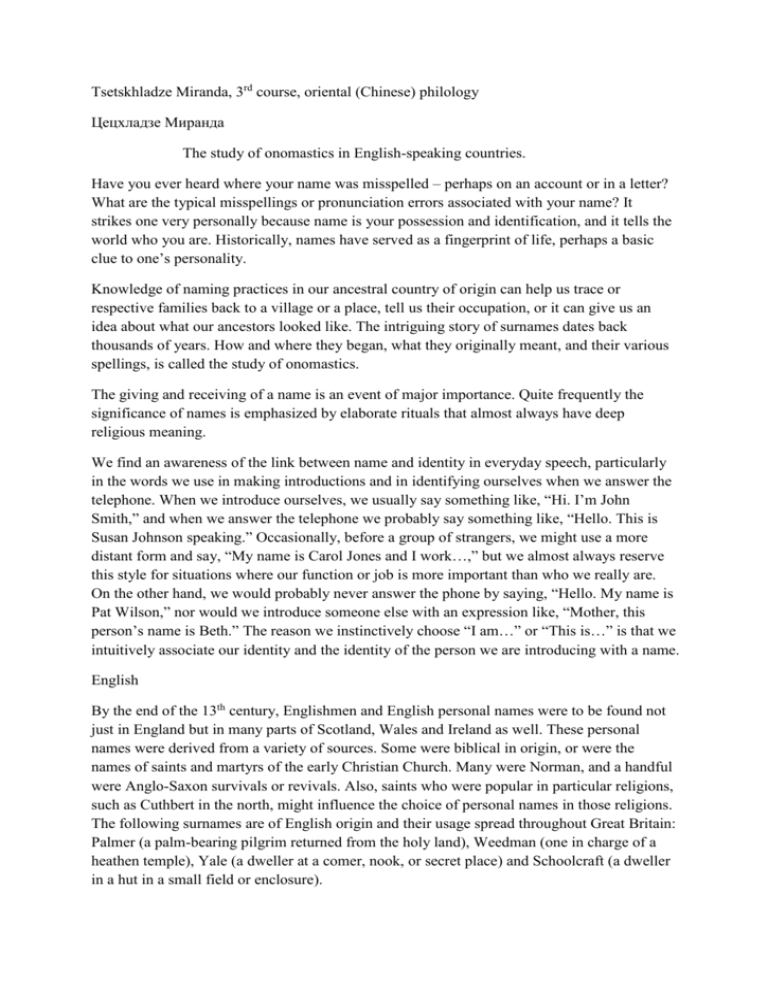
Tsetskhladze Miranda, 3rd course, oriental (Chinese) philology Цецхладзе Миранда The study of onomastics in English-speaking countries. Have you ever heard where your name was misspelled – perhaps on an account or in a letter? What are the typical misspellings or pronunciation errors associated with your name? It strikes one very personally because name is your possession and identification, and it tells the world who you are. Historically, names have served as a fingerprint of life, perhaps a basic clue to one’s personality. Knowledge of naming practices in our ancestral country of origin can help us trace or respective families back to a village or a place, tell us their occupation, or it can give us an idea about what our ancestors looked like. The intriguing story of surnames dates back thousands of years. How and where they began, what they originally meant, and their various spellings, is called the study of onomastics. The giving and receiving of a name is an event of major importance. Quite frequently the significance of names is emphasized by elaborate rituals that almost always have deep religious meaning. We find an awareness of the link between name and identity in everyday speech, particularly in the words we use in making introductions and in identifying ourselves when we answer the telephone. When we introduce ourselves, we usually say something like, “Hi. I’m John Smith,” and when we answer the telephone we probably say something like, “Hello. This is Susan Johnson speaking.” Occasionally, before a group of strangers, we might use a more distant form and say, “My name is Carol Jones and I work…,” but we almost always reserve this style for situations where our function or job is more important than who we really are. On the other hand, we would probably never answer the phone by saying, “Hello. My name is Pat Wilson,” nor would we introduce someone else with an expression like, “Mother, this person’s name is Beth.” The reason we instinctively choose “I am…” or “This is…” is that we intuitively associate our identity and the identity of the person we are introducing with a name. English By the end of the 13th century, Englishmen and English personal names were to be found not just in England but in many parts of Scotland, Wales and Ireland as well. These personal names were derived from a variety of sources. Some were biblical in origin, or were the names of saints and martyrs of the early Christian Church. Many were Norman, and a handful were Anglo-Saxon survivals or revivals. Also, saints who were popular in particular religions, such as Cuthbert in the north, might influence the choice of personal names in those religions. The following surnames are of English origin and their usage spread throughout Great Britain: Palmer (a palm-bearing pilgrim returned from the holy land), Weedman (one in charge of a heathen temple), Yale (a dweller at a comer, nook, or secret place) and Schoolcraft (a dweller in a hut in a small field or enclosure). Irish Hereditary surnames were first used in Ireland as early as the 10th century, but the custom did not become widespread until the 12th century. Because ownership of lad was determined by family relationships, pedigrees were accurately maintained from early times. This interest in descent is also the reason most Irish names are patronymics, which are signified by either O or Mac. O stands for the old Gaelic word ua, meaning descended from, while Mac means son and is sometimes abbreviated to Me or M’. Because of persecution, many people dropped the O and Mac from their names, but in modern times, the use of prefixes has been resumed. Some interesting Irish surnames include the following: McClary (son of the clerk), Rogan (one with red hair, or a ruddy complexion), Ryan (the grandson of Rian; little king) and Tamory (the son of the gympanist). Scottish During the Middle Ages, the infant mortality rate in Scotland was high. For this reason, many Scottish families would use the same name over and over so that one family might have several children with the same name if more than one child survived. They also changed their surnames if they changed residence. Even through the 18th century, many Scottish women retained their own names when they married. This may be a carry over of an even older custom of the man taking the wife’s name at the time of marriage. There are two groups of Scottish surnames: Highland and Lowland. The Highland surnames developed slowly, and it was not until the 8th century that a man ceased to be designated by his father’s name. The clan system was largely responsible for preserving the old ways of the Highlanders. A man would join a clan for protection and, to show his allegiance, he would then adopt a clan surname - usually Mac followed by the chiefs’ name. As chieftainship was hereditary, the names were mainly patronymic. In the Lowlands, the use of surnames developed much the same as English surnames, although at a somewhat slower pace. Many Lowland surnames are indistinguishable from English ones. Some examples of surnames of Scottish origin include the following: Mawhiney (son of Suibhne; well going), Peebles (a dweller in a tent, or assembly hall; one who came from Pebbleshire), Scrimgeour (one who taught fencing, a fencing master), and Rutherford (one who came from a river passage used by cattle). Welsh Fixed family names are a recent introduction to Wales. Before they were imposed for legal purposes, fixed family names were neglected in favor of patronymic surnames. These were essentially a genealogical history of the family, where one generation was connected to another by ap, which means “son of”. Names such as Llewelyn ap Dafydd ap, Leuan ap Griffith ap Meredith were not uncommon. At the end of the 19th century, this practice ceased and ap was usually combined with one name to yield surnames such as Upjohn (from Apjohn) and Powell (from Aphowell). The following surnames are of Welsh origin: Heavens (descendant of Evan, the Welsh from of John), Mattock (son of Madog, or Madoc; fortunate), Parsons (the son of a parson, or son of Peter) and Ryder (the rider, or trooper; a mounted guardian of a forest). American Indian Names Indian names reflect the culture of a particular tribe. Generally, most Indians have a birth name, such as “Sunrise Beauty;” a family name, “Smooth Water;” and an adult name, “White Mountain”. These names are always symbolic, although each tribe has it’ own naming practices. Sometimes names are kept secret because of religious laws, in many tribes, a child will be given one name at birth, and other names during various stages of his or her life. As individuals take a new name, they discard the earlier one. For legal identification purposes, many Indians assumed “Americanized” names such as Frank Beaver, or Willard Rivers. Emigrant Black Names The majority of the names of black North Americans are similar to those of the white population. During the years of slavery, many were given names, some biblical, by the plantation owners. After slavery, many black Americans adopted the surnames of their former owners. But after the rise of the Civil Rights Movement, some blacks changed their names for religious reasons or to reflect their African heritage. Some blacks have converted to the Muslim religion and taken Muslim names. Others have given their children names from such African languages as Arabic, lbo, Iikuyu, Swahili, or Yoruba. Some children have such names as Aba (born on Thursday), Dakarai happiness), Aduke (much loved) and Marjani (Lord). Our surname, like our Christian name, is something very personal and dear to us. Our family name gives us an opportunity of a flashback. Thanks to it, we receive some information about our predecessors. Loose your name and you will loose your soul. In old Egypt great criminals were punished by depriving them of their names. Thus they couldn’t receive any rights in their life and after their death in Aid. To preserve your family history, your pride you must preserve your surname. And the only way to do it is to receive and to pass on the torch to your children and grandchildren. Success attends you on this way!
